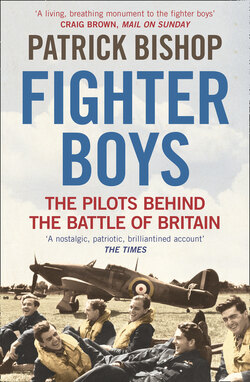Читать книгу Fighter Boys - Patrick Bishop - Страница 7
Introduction
ОглавлениеWhen I started writing this twenty-one years ago, there were still many Fighter Boys alive. As I write there are only two. All the rest have joined their comrades in the great squadron bar in the sky.
The book started off as a novel. I had just been terminated – with extreme delicacy – as foreign editor of the Daily Telegraph and restored to my old job of roving foreign correspondent. I was not sorry to leave executive life but wanted a break before going back on the road, and my editor agreed to a sabbatical. I headed off to Paris, rented a small flat in the rue du Cherche-Midi and spent my days writing and my evenings hanging out with other struggling literary types. I did not have to look hard for a story. I spent the first part of my childhood in Charing, Kent, before the family moved to Raynes Park in southwest London. The Battle of Britain was fought in the skies above these places, and the spirit of the event seemed somehow to live on in them, despite the fact that it had taken place twelve years before my birth. The narrative featured a romantic Polish fighter pilot, a roguish Anglo-Irish soldier-adventurer and a love triangle. No one was interested in the novel, but Michael Fishwick at HarperCollins saw something he liked and suggested that I forget fiction and concentrate on fact. It was a good idea and the timing was perfect.
The Battle of Britain comes and goes in the national memory, and this was one of the dim periods. No book, film or TV show that captured the public imagination had appeared for a while. Plenty had been written, but there seemed to me to be something missing from the story. It was the pilots themselves. Yes, a number of autobiographies had appeared in the years after the war, but they were products of their time, and not much more revealing of the inner life of the authors than a Boy’s Own Paper yarn. I wanted to know who they really were and why they did what they did. These questions were answered brilliantly in a book that appeared at about the same time as mine. Geoffrey Wellum was one of the many pilots I interviewed, and when he told me that he had written his own book, I left him to speak for himself. The result was First Light, which will endure as one of the great accounts of the experience of war in the air.
Geoffrey’s book brought the story back to what for me was the essential. The literature of the Battle of the preceding years had boiled the business down to a matter of machines, technology, organisation, strategic and tactical decision-making and the like. This approach tended to diminish the role of the pilots, which I saw as being crucial. The Battle of France had shown that you could have all the material advantages and still lose. What mattered was the character, motivations and morale of the participants.
At that time there were still plenty of survivors with whom to talk about these things. Over a couple of years, I criss-crossed the country. The men I met were, as the propaganda of the day proclaimed, a mixed bunch, from all backgrounds and regions. In some respects, they were all the same. They were almost all of them modest, courteous and good-humoured. Some were just seeing me out of politeness. Others spoke freely and openly. It was not facts I was after so much as recollections of mood and atmosphere. A few I encountered several times and a sort of friendship developed. I grew particularly fond of Billy Drake, a veteran of the Battles of France and Britain and the desert air campaign in North Africa. We had lunch or dinner occasionally, and I took him down to his old stomping ground at Tangmere. As he talked in his gentle, amused way I could easily discern in his handsome old face the young paladin of sixty years before.
Through his testimony, and that of many others, I tried to give an impression of what the Battle of Britain felt like for those who fought it. When Peter Brothers, one of the great figures of the fighter war, said in a speech at a veterans dinner that the book had ‘reminded us of who we were’, I felt that perhaps I had succeeded.
